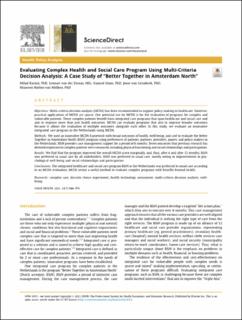| dc.contributor.author | Karimi, Milad | |
| dc.contributor.author | van der Zwaan, Lennart | |
| dc.contributor.author | Islam, Kamrul | |
| dc.contributor.author | van Genabeek, Joost | |
| dc.contributor.author | Rutten-van Mölken, Maureen | |
| dc.date.accessioned | 2021-10-04T09:04:37Z | |
| dc.date.available | 2021-10-04T09:04:37Z | |
| dc.date.created | 2021-06-01T13:30:48Z | |
| dc.date.issued | 2021 | |
| dc.identifier.issn | 1098-3015 | |
| dc.identifier.uri | https://hdl.handle.net/11250/2787404 | |
| dc.description.abstract | Objectives: Multi-criteria decision analysis (MCDA) has been recommended to support policy making in healthcare. However, practical applications of MCDA are sparse. One potential use for MCDA is for the evaluation of programs for complex and vulnerable patients. These complex patients benefit from integrated care programs that span healthcare and social care and aim to improve more than just health outcomes. MCDA can evaluate programs that aim to improve broader outcomes because it allows the evaluation of multiple outcomes alongside each other. In this study, we evaluate an innovative integrated care program in the Netherlands using MCDA.
Methods: We used an innovative MCDA framework with broad outcomes of health, well-being, and cost to evaluate the Better Together in Amsterdam North (BSiN) program using preferences of patients, partners, providers, payers, and policy makers in the Netherlands. BSiN provides case management support for a period of 6 months. Seven outcomes that previous research has deemed important to complex patients were measured, including physical functioning and social relationships and participation.
Results: We find that the program improved the overall MCDA score marginally, and, thus, after 6 and after 12 months, BSiN was preferred to usual care by all stakeholders. BSiN was preferred to usual care, mostly owing to improvements in psychological well-being and social relationships and participation.
Conclusions: The integrated healthcare and social care program BSiN in the Netherlands was preferred to usual care according to an MCDA evaluation. MCDA seems a useful method to evaluate complex programs with benefits beyond health. | en_US |
| dc.language.iso | eng | en_US |
| dc.publisher | Elsevier | en_US |
| dc.rights | Navngivelse 4.0 Internasjonal | * |
| dc.rights.uri | http://creativecommons.org/licenses/by/4.0/deed.no | * |
| dc.title | Evaluating Complex Health and Social Care Program Using Multi-criteria Decision Analysis: A Case Study of “Better Together in Amsterdam North” | en_US |
| dc.type | Journal article | en_US |
| dc.type | Peer reviewed | en_US |
| dc.description.version | publishedVersion | en_US |
| dc.rights.holder | Copyright 2021, ISPOR–The Professional Society for Health Economics and Outcomes Research. | en_US |
| cristin.ispublished | true | |
| cristin.fulltext | original | |
| cristin.qualitycode | 1 | |
| dc.identifier.doi | 10.1016/j.jval.2021.02.007 | |
| dc.identifier.cristin | 1913054 | |
| dc.source.journal | Value in Health | en_US |
| dc.source.pagenumber | 966-975 | en_US |
| dc.relation.project | EC/H2020/634288 | en_US |
| dc.identifier.citation | Value in Health. 2021, 24 (7), 966–975. | en_US |
| dc.source.volume | 24 | en_US |
| dc.source.issue | 7 | en_US |

